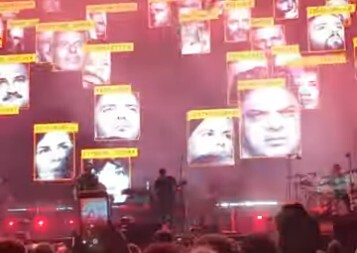Good. People don’t understand implications until it happens to them. Suddenly they don’t like this security features anymore because it became personal.
We need more people to experience that discomfort
Nice, face recognition surveillance for sure is because to protect our childrens.
Who the hell can afford children ?
Some people on islands can afford many
Pretty cool… But anyone else get major AI vibes from the way this article is written?
Why even become a journalist anymore if you’re just going to be putting prompts into a black box and copy/pasting the output?
But that’s what capitalism is all about! Efficiency.
Now one journal-ist can produce hundreds of art-ickles per hour!
/s
This article gives me vibes that someone wrote a few lines outlining the situation and asked the AI to write the article itself. Interestingly though, I think most people would just rather read the outline, less time wasted and less llm.
A part that screams AI would be:
This wasn’t subtle venue security—your biometric data became part of the artistic statement, whether you consented or not.
“This isn’t this–it’s that” is an extremely common AI sentence structure, further exposed by the fact that the part before the em-dash doesn’t even make sense to begin with. No one was asking themselves whether it was part of subtle venue security.
As a sidenote, sometimes I read sentences like this and I wonder “could this ever even have been written by a human?” I think that there’s a very low chance that this article didn’t have at least some amount of AI involved, but I know that somewhere out there there must be some people who actually write like this. And that’s kind of sad.
tbh I don’t even know why I even wrote this, the entire article appears to be one big example of generic AI writing
“The Consent Question Nobody Asked”
Yeah, that tastes like AI this turn of phrase
The only people offended by this are the ones who dont yet understand that this is happening constantly all over the place without your consent already.
It’s a great way to showcase that these things are in use and will be in use in places with bad privacy laws (and by those that ignore such laws). Most people don’t want to think that this happens on a daily basis, it’s logical for them when you tell them, but they’re busy with their lives and they don’t actually see it being done with their own eyes.
Now tell them how this data is connected to your ticket and your face/video being analyzed after the fact, which is then sold off to become what is basically an quantification of you as a person to judge you and determine what your addictions, views and flaws are, in order to expoit it to make you as miserable as possible. And people won’t really believe it since it’s uncomfortable to believe in. Showing someone’s face makes it more believable and difficult to ignore.
The only people offended by this are those who have something to hide!
/s
Which would be most people?
Yes, the ignorants, which is exactly why we have artists, it’s basically their most important jerb
Nah, not anymore. These tools are starting to be used by police without any remorse, so an ever increasing amount of people are aware. Its being used against immigrants, journalists, activists, etc. so the normie and privacy nerd worlds are starting to overlap.
Something happening all the time doesn’t mean that it’s good and you should just accept it.
No of course not. But in order to be able to not accept it, you have to know about it in the first place. Thats what this is perfect for. No harm done, lots of eyes opened.
deleted by creator
deleted by creator
People getting mad at massive attack are missing the point completely
Massive Attack = Banksy. You heard it from me first. Or maybe you didn’t and you knew it already all along.
Shhht, the british government is looking for him
Welcome to The Truman Show.
If this disturbs you, then good. That was the point.
These guys are amazing. Of all the shows I saw at Roseland NYC, theirs in 96 was the absolute best.
The singer has always been about exposing problems the media won’t cover. I think it actually led to a schism and a few of the members leaving about two decades ago.
Did you see portishead? Just curious.
Cowboys by Portishead gives me goosebumps every time I hear it
Edit: Link, because I had to go listen to it as it’s been years: https://youtu.be/ApQpx-MVk0w
Summer of 97. I had just turned 18.
Whenever I hear, teardrop, I am transported back to that night at Roseland.
Roseland was perhaps the greatest musical venue ever do exist. Better than CBGBs.
deleted by creator
It was. I was there. What a night…
To be clear, the system picked out faces in the crowd, in the “yes, this is a face” sense. They were labeled in what appears to be random terms like positive, kind, nostalgic, bee keeper, gif animator, extreme ironer. No personal identification.
extreme ironer
I did come across that hobby when I was trying to list examples of productive sports. Yeah, it’s a thing.
Yeah this article is hot garbage. What “biometric data” are they talking about??? Just images of people’s faces? My understanding is that it’s super commonplace in public locations, are people really that surprised?
Yes, while its generally common on this platform, we are early adopters for tech so we understand it first. The general public gets exposure much slower, especially when there is efforts to subvert it for profit.
Attention and time are limited, those that focus on tech know things first. Its the same as a chef knowing about food more than the average person.
That is technically biometric data
Technically it’s not until it’s quantified and hashed, it’s just an image. Until measured, it’s not metrics.
An image is a quantization of reality. An image alone is biometric data if it’s a picture of a face, fingerprint, or any other identifiable feature of a person.
It’s very easy for even a private citizen to get a lot of information from someone just by using a picture of their face.
Oh that’s very interesting. I didn’t get that nuance from the article. Do you have a link to more info?
Yes, it’s the link to the Youtube clip in the embed in the article.
Specifically, this link, which looked like a twitter link to me.
So a normal concert?
Still, why the fuck does that exist, and why is it allowed? It shouldn’t be there.
I think that was their point… to call out the use of facial recognition
Yeah
No shit
That was the point
I believe this would be illegal in Illinois, which regulates biometric data collection
https://x.com/IpswichPolice/status/1892910824517177743
I do trust Massiva Attack more than this violent gang of thugs
Social media erupted with bewildered reactions from attendees. Some praised the band for forcing a conversation about surveillance that most people avoid, while others expressed discomfort with the unexpected data capture.
Unlike typical concert technology that enhances your experience, this facial recognition system explicitly confronted attendees with the reality of data capture. The band made visible what usually happens invisibly—your face being recorded, analyzed, and potentially stored by systems you never explicitly agreed to interact with.
The audience split predictably along ideological lines. Privacy advocates called it a boundary violation disguised as art. Others viewed it as necessary shock therapy for our sleepwalking acceptance of facial recognition in everyday spaces. Both reactions prove the intervention achieved its disruptive goal.
Your relationship with facial recognition technology just got more complicated. Every venue, every event, every public space potentially captures your likeness. Massive Attack simply made the invisible visible—and deeply uncomfortable. The question now isn’t whether this was art or privacy violation, but whether you’re ready to confront how normalized surveillance has become in your daily life.
This is why I no longer go out in public.
I dont go out because outside costs $250 a day.
🤔
Good. A little bit of shock treatment is just what the doctor ordered.
Now consider this to coldplay concert where they urged the crowd to send love to Charlie Kirk’s family lol.
It’s okay, if Coldplay is a honeypot to lure execs onto camera to self-own
Damn lol. Didn’t think I could like coldplay any less.
Citizen, this is the warm embrace of Father State and Mother Country taking care of you. Everywhere. All the time. We care about you. We worry about you. And if we feel like you need help, we will help.
Can I have housing OwO ?
Citizen, we have detected Bad Thought, as well as sarcasm. Have no fear, re-education drones as well as Correct Thought beams are headed your way! Please take this time to make sure the correct flags and slogans are on prominent display.
Have a Wonderful Day!
You have come to the wrong neighbourhood

This disturbs me in the best way. I love/hate it.
I wonder how long they can run this before their backend database vendor cuts them off with some flimsy pretext because this kind of thing is bad for business.
No backend database needed for what they did. It was just highlighting where the faces are in a shot of the crowd, same as modern smartphone cameras do, but with a surveillance-type UI around it.
Thanks, I just watched the video linked by @spizzat2@lemmy.zip and I see that now. It’s actually a little disappointing and I’d love to see the same kind of public spectacle on hard mode with real-time doxxing from a commercial backend. That would be far more provocative.
I think the article hugely understated that nuance.
Yeah, it should at least try to get their name. If it could include their job, income, family members, etc. that’d be great. It’s pretty trivially possible. Maybe don’t include address, because they could turn out poorly, but they should show how easy it is to get data on people.
That would be far more provocative.
Yes, but depending on the country that could be (public + illegal) if it lists [what is legally considered] personal sensitive information or accidentally reveals someone’s secret like the Coldplay incident.
It would be fascinating, but IMO unnecessary and unethical.
Perfectly legal for “event security” to deploy facial recognition and watch live movement tracking annotated with real names and possibly other information purchased from a data broker, as long as it’s all done in secret. But illegal to let large numbers of people see the screen (maybe by mirroring it to the jumbotron). What a world.
oh dont worry event security and LEA are neutral unbiased entities who can be trusted unlike the public
At first I was imagining it was picking out faces from the crowd and matching them with social media pictures which it was then broadcasting to the crowd. THAT would get people’s attention!
Most people don’t know the difference, as made clear by the reactions of the public, comments on other social platforms, and the wording of the articles. So it’s just as powerful as it was.
I will agree that it was still powerful. All of the phone videos would memorialize any real doxxing so it’s maybe just as well that they didn’t do it.
I think it would be better with minor obfuscation like F***e L***e for Firstname Lastname. Something instantly recognizable to the victims/participants but not for the entire audience.
the 20th anniversary of mezzanine @ radio city with full orchestral band all instrumental was wiiiiild too; kudos!















